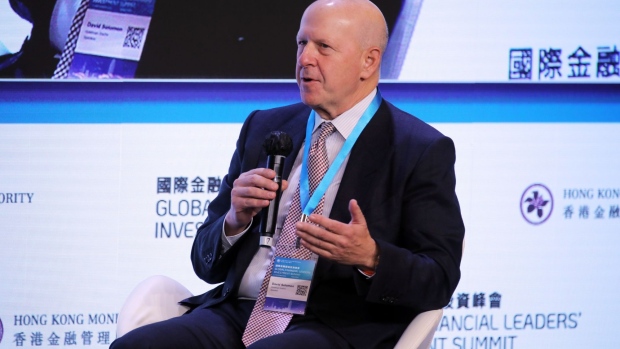Nov 2, 2022
Hong Kong Summit Steers Clear of Talk on China Risks, Reopening
, Bloomberg News

(Bloomberg) -- As Wall Street’s biggest bosses gathered on a panel at Hong Kong’s big financial comeback summit, one major topic was avoided: China’s growing risks.
Goldman Sachs Group Inc. Chief Executive Officer David Solomon and Morgan Stanley’s James Gorman, among others, instead focused on inflation, market volatility and whether central banks can engineer a soft landing around the world at a panel moderated by Hong Kong Monetary Authority Chief Executive Eddie Yue.
Chinese regulators, speaking on an earlier panel, even called on the gathered bankers to look on the bright side, avoid reading international media and instead study President Xi Jinping’s latest work paper.
“Don’t bet against China,” Fang Xinghai, a vice chairman of the China Securities Regulatory Commission, said in a recorded interview at the gathering of more than 200 top financiers. China’s opening can only become “bigger and bigger” going forward, he said.
One executive to touch on the subject was UBS Group AG Chairman Colm Kelleher, who said he doesn’t read the American press and is “very pro China.”
“We actually buy the story, but it’s a bit waiting for Zero Covid to open up in China,” he said.
The stakes are high for global banks such as Goldman Sachs and UBS, who have been building up in China as the country opened its doors to full foreign ownership of securities firms and wealth managers over the past years.
But concerns are growing over the trajectory of the world’s second-largest economy. Chinese markets, and those in Hong Kong, tumbled last month after Xi secured a third term and stacked key positions with allies. That raised further doubts among global investors, whose confidence in China has been dented by the strict pursuit of Covid Zero and a crackdown on private enterprise and the property market.
To hammer in the risks as the summit was kicking off in Hong Kong, authorities in China ordered a seven-day lockdown of the area around Foxconn Technology Group’s main plant in Zhengzhou, a move that will severely curtail shipments in and out of the world’s largest iPhone factory.
Stocks had rallied in the run-up to the summit, in part on rumors that China is forming a committee to exit its strict pursuit of Covid Zero. China’s Foreign Ministry said it was unaware of such a committee.
Fang stressed that China would continue its opening as it still doesn’t have enough high quality institutional investors. “We want to share China’s growth with the rest of the world,” he said.
So far, global banks have exceeded their plans in the country, Fang said.
Hong Kong leader, John Lee, also took the opportunity in his key note speech to highlight the city as an irreplaceable connection between the Chinese mainland and the rest of the world. Still, the city has lost ground as a financial hub, in particular to Singapore where money and talent is pouring in.
The high-profile gathering in Hong Kong has drawn criticism from some US lawmakers, who urged bankers to cancel their visits to avoid legitimizing the recent crackdown on freedoms. Lee, who left the venue before the banker panel started, was sanctioned by the US along with other officials for his role in the crackdown on the city after Beijing imposed a national security law in 2020.
In an interview with Bloomberg Television outside of the summit, HSBC Holdings Plc Chief Executive Officer Noel Quinn said he was upbeat on China. “We are continuing to invest in our wealth business in China and also in Singapore and India,” Quinn said. “China will emerge from Covid. It will rebound.”
Another banker in attendance at the meeting, Axel Lehmann, the chairman of Credit Suisse Group AG, said he hopes China will exit Covid Zero this year, but that it’s up to the government to decide. The most important for China and Hong Kong is to “get back to normal as quick as possible,” he said in an interview at the summit.
The firm, which is undergoing a major restructuring, sees China as a great market opportunity for “many, many years to come,” he said.
On more global topics, Goldman’s Solomon warned of considerable uncertainty ahead and said that a better equilibrium will probably be reached in the markets in the coming quarters. Morgan Stanley’s Gorman said it was improbable that inflation rates will go back to 1% to 2% and that interest rates will remain at 4% to 5% over the next few years.
“There’s still a significant amount of uncertainty as we get into 2023,” Solomon said. As we “start to have a clear understanding of the trajectory of capital markets, I think you’ll see issuers and capital allocators meet again in the middle, although with different valuations and a different cost of capital they have operating with over the course of last decade.”
--With assistance from Denise Wee, Yvonne Man, Kiuyan Wong, Ambereen Choudhury and Adam Haigh.
(Adds comment from Credit Suisse in 16th paragraph.)
©2022 Bloomberg L.P.


